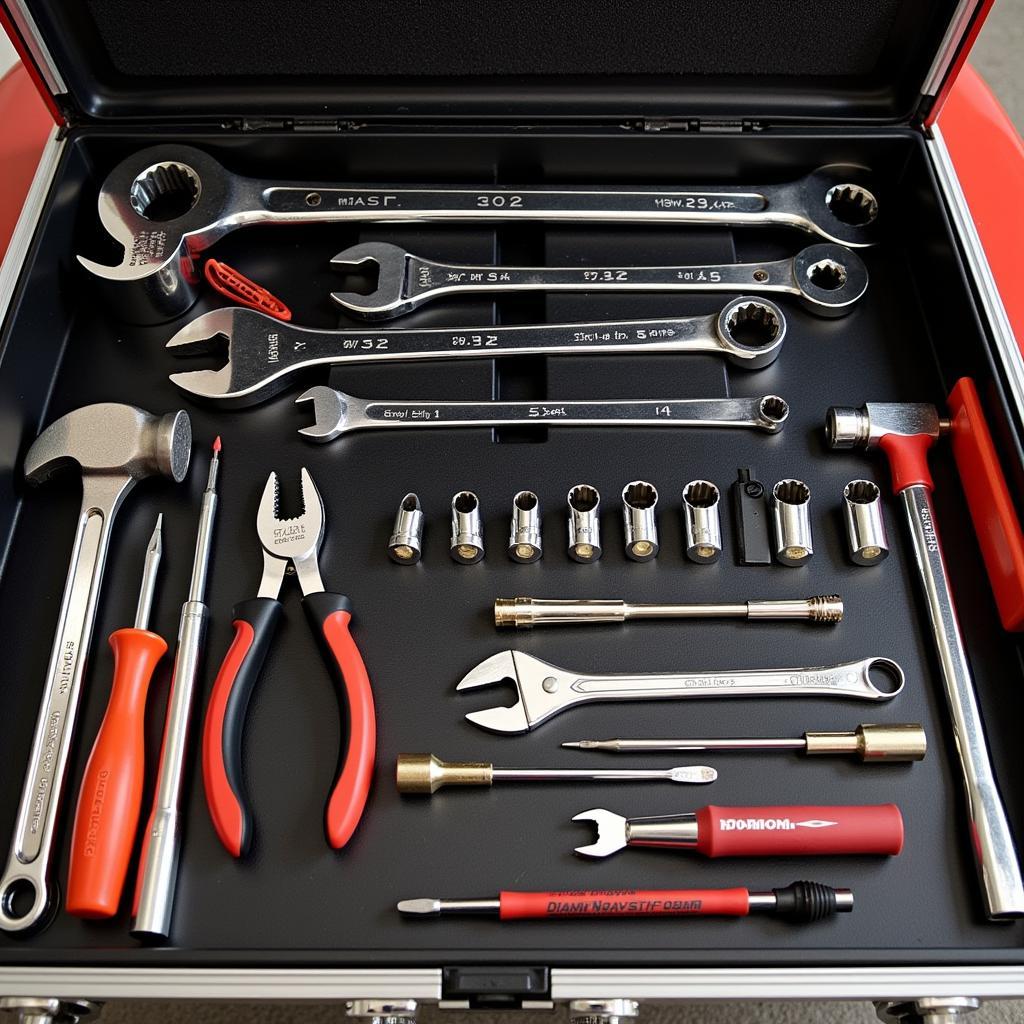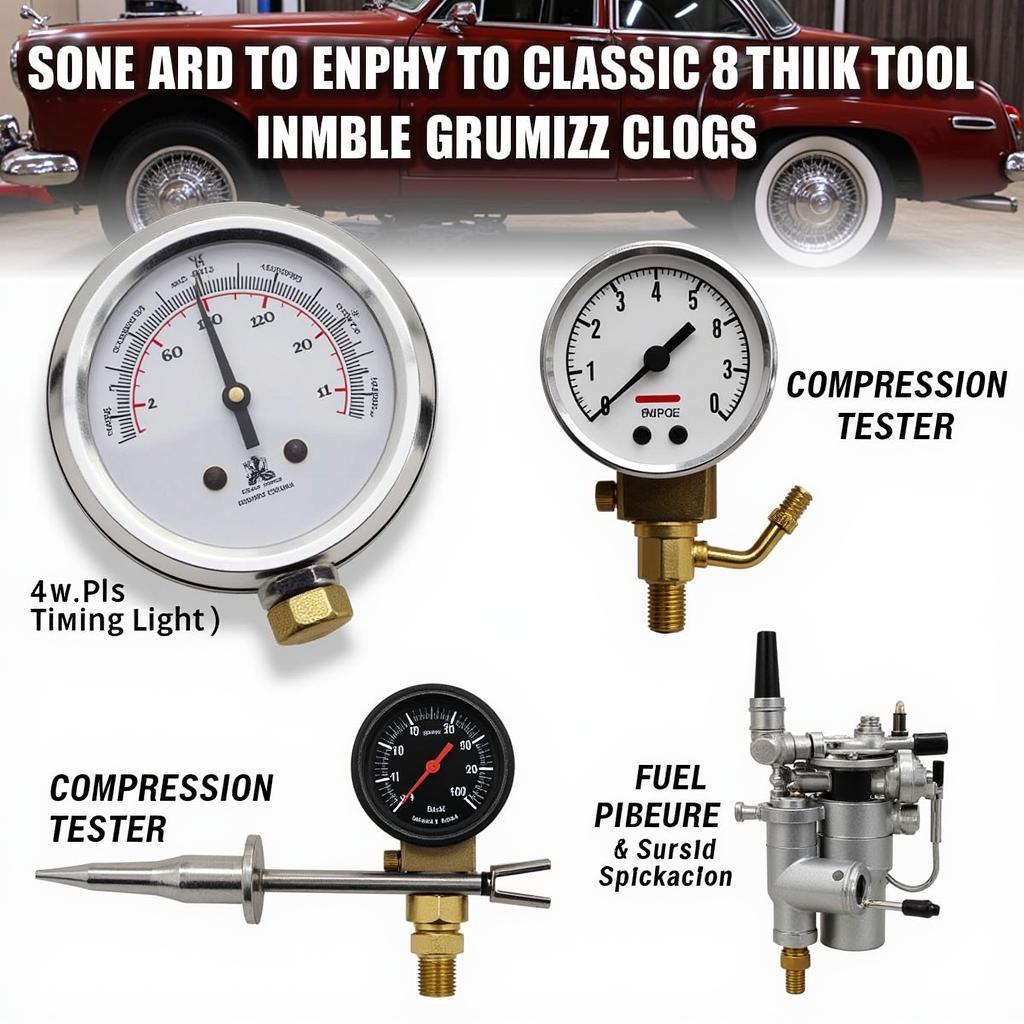A well-equipped Classic Car Tool Box is essential for any enthusiast. Whether you’re a seasoned mechanic or just starting out, having the right tools can make all the difference when it comes to maintaining and repairing your vintage vehicle. This guide will explore the must-have tools for your classic car tool box, ensuring you’re prepared for any roadside emergency or restoration project. We’ll also cover how to choose quality tools and organize your toolbox for maximum efficiency. Let’s dive in and build the ultimate classic car tool box together.
Having a reliable set of tools can save you time, money, and frustration in the long run. It allows you to tackle minor repairs yourself, saving a trip to the mechanic. For more complex tasks, the proper tools enable you to confidently diagnose issues before consulting a professional. Understanding the specific needs of your classic car is crucial in selecting the appropriate tools. For instance, a car start hand crank tool might be essential for some vintage vehicles. You can find more information on such tools on our website, specifically the article on car start hand crank tool.
Essential Tools for Every Classic Car Tool Box
A comprehensive classic car tool box should contain a mix of general-purpose and specialized tools. Here’s a breakdown of the essentials:
- Wrenches: A set of combination wrenches (both open-end and box-end) in both metric and SAE sizes is essential.
- Sockets: Invest in a quality socket set with both deep and shallow sockets, along with various extensions and adapters.
- Screwdrivers: A variety of Phillips and flathead screwdrivers in different sizes are a must.
- Pliers: Needle-nose pliers, slip-joint pliers, and locking pliers are indispensable for gripping, cutting, and manipulating various components.
- Hammer: A ball-peen hammer and a rubber mallet are useful for tapping and shaping metal parts without causing damage.
These tools form the foundation of any good classic car toolbox. Consider expanding your tool collection as you gain more experience and tackle more complex projects. Sometimes, a multi-purpose tool can be incredibly handy. You can check out our article on the best fix it tool cars multitool for recommendations.
 Essential tools for a classic car toolbox – wrenches, sockets, screwdrivers, pliers, and a hammer.
Essential tools for a classic car toolbox – wrenches, sockets, screwdrivers, pliers, and a hammer.
Specialty Tools for the Classic Car Enthusiast
Beyond the basics, certain specialized tools can prove invaluable for classic car maintenance and repair:
- Timing Light: Essential for setting the ignition timing accurately.
- Compression Tester: Diagnoses engine health by measuring cylinder pressure.
- Fuel Pressure Tester: Checks the fuel pump and fuel regulator function.
- Carburetor Synchronization Tool: Balances the airflow in multi-carburetor setups.
These specialized tools are essential for tackling more complex tasks and ensuring optimal performance. Thinking about buying a new car and not just working on your classic? Check out our resource on the best car buying tools. It might be helpful!
Why Invest in Quality Tools?
While it can be tempting to opt for cheaper tools, investing in high-quality tools is a worthwhile investment. Quality tools are more durable, offer better precision, and can ultimately save you money in the long run.
 High-quality tools for classic car maintenance – timing light, compression tester, fuel pressure tester, and carburetor synchronization tool.
High-quality tools for classic car maintenance – timing light, compression tester, fuel pressure tester, and carburetor synchronization tool.
“Investing in quality tools is like investing in your classic car’s future,” says renowned classic car mechanic, Robert “Bob” Johnson. “Cheap tools can break easily, leading to frustration and potentially damaging your vehicle. Quality tools are built to last and provide the precision you need for accurate repairs.”
Organizing Your Classic Car Tool Box
A well-organized toolbox is just as important as the tools themselves. Keep your tools neatly arranged and easily accessible to save time and avoid frustration.
What are some tips for organizing a classic car tool box?
Some tips for organizing your classic car tool box include using tool organizers, labeling drawers, and keeping a detailed inventory of your tools. This makes it easy to find the tool you need when you need it. For those unexpected situations, knowing how to handle a lockout situation without tools is also helpful. Our article on honda accord 1999 lx locked keys in car no tools might be a useful read.
Conclusion
Building a comprehensive classic car tool box is a journey, not a destination. Start with the essentials and gradually expand your collection as you gain experience. Remember to prioritize quality, organization, and the specific needs of your classic car. With the right tools and a little know-how, you can keep your vintage vehicle running smoothly for years to come. Knowing how to diagnose common issues, like oil in the air filter box, is also crucial. See our guide on car diagnostic oil in air filter box for more information.
“A well-equipped classic car tool box empowers you to take control of your car’s maintenance and repair,” adds Johnson. “It’s an investment that pays off in both satisfaction and peace of mind.”
For any assistance with your classic car, reach out to our expert team via WhatsApp: +1(641)206-8880, Email: [email protected] or visit us at 910 Cedar Lane, Chicago, IL 60605, USA. Our customer service is available 24/7.

Leave a Reply